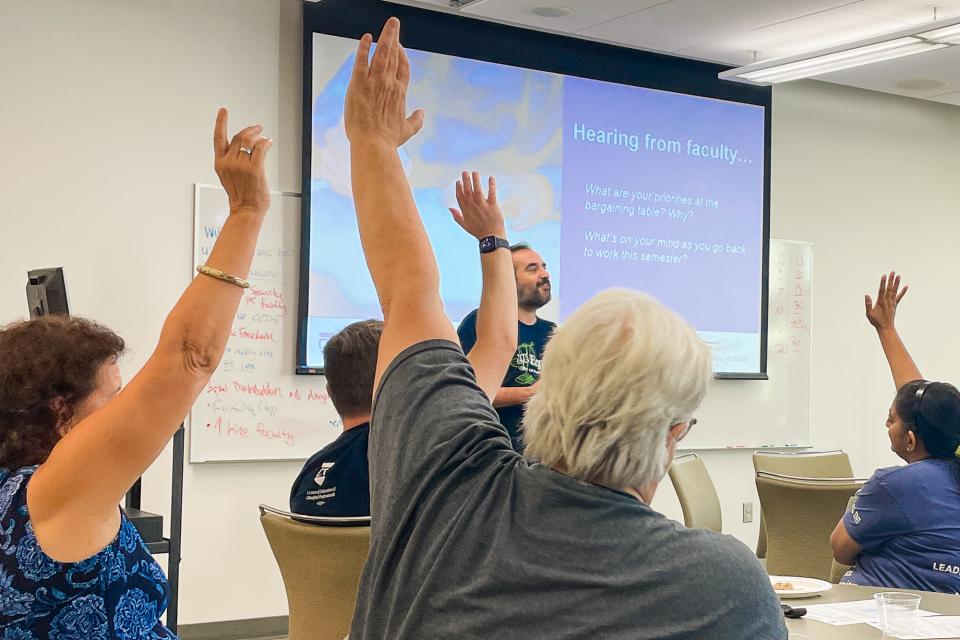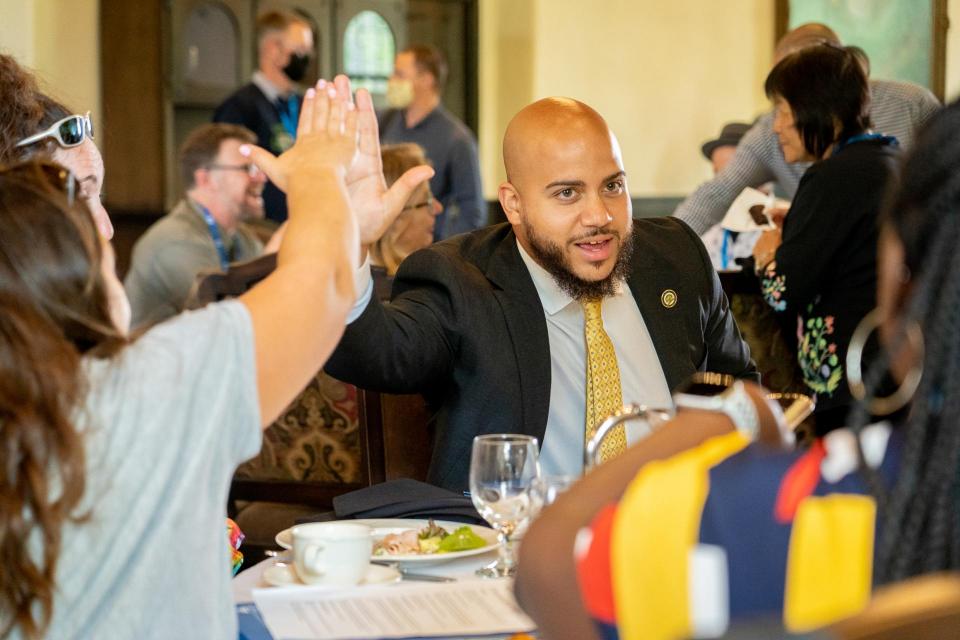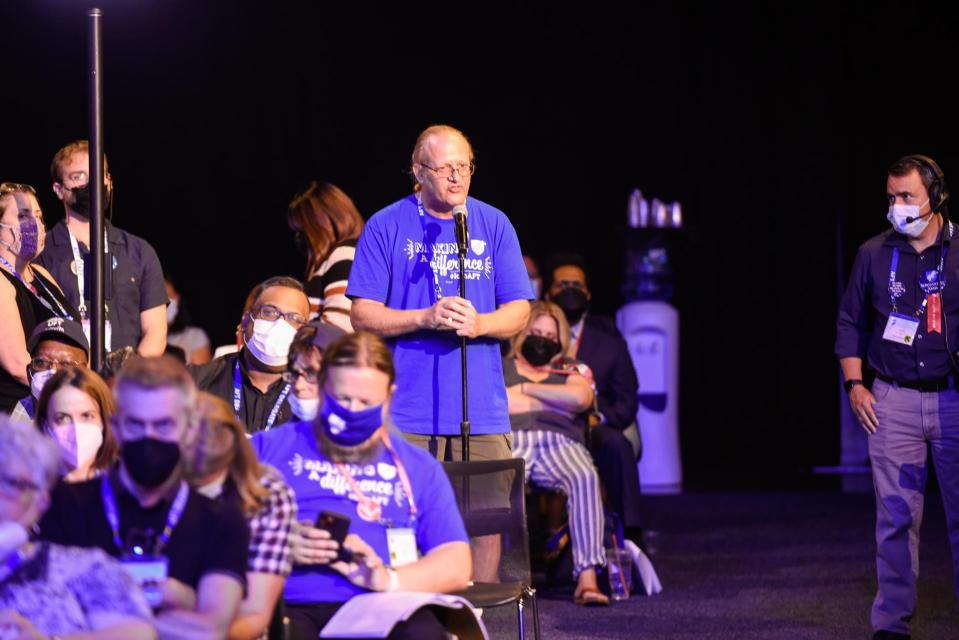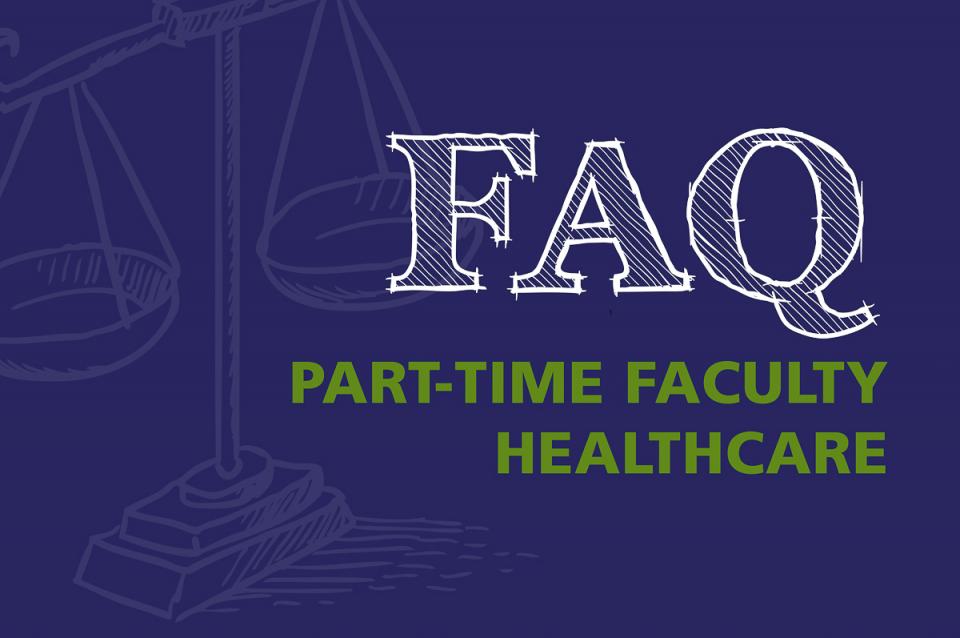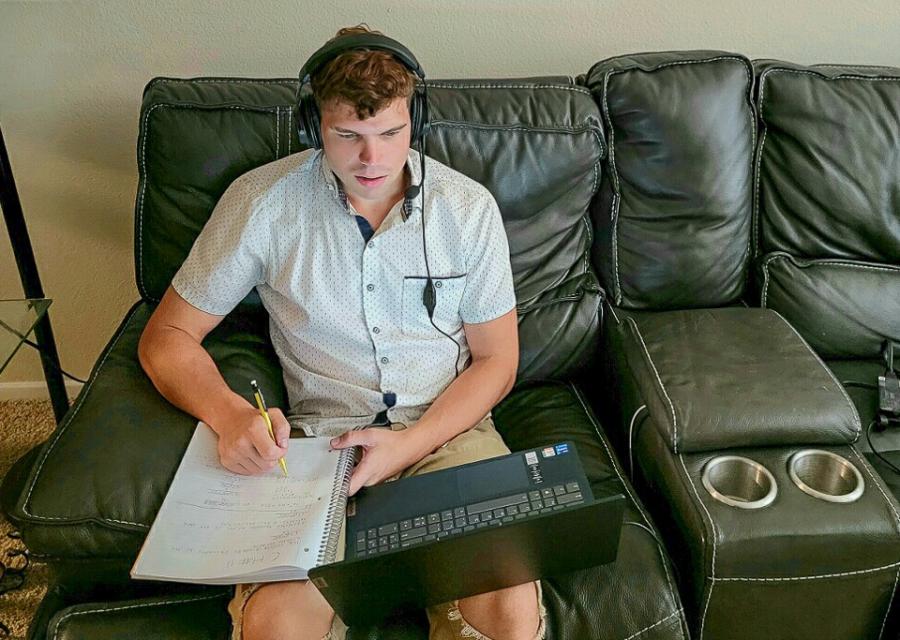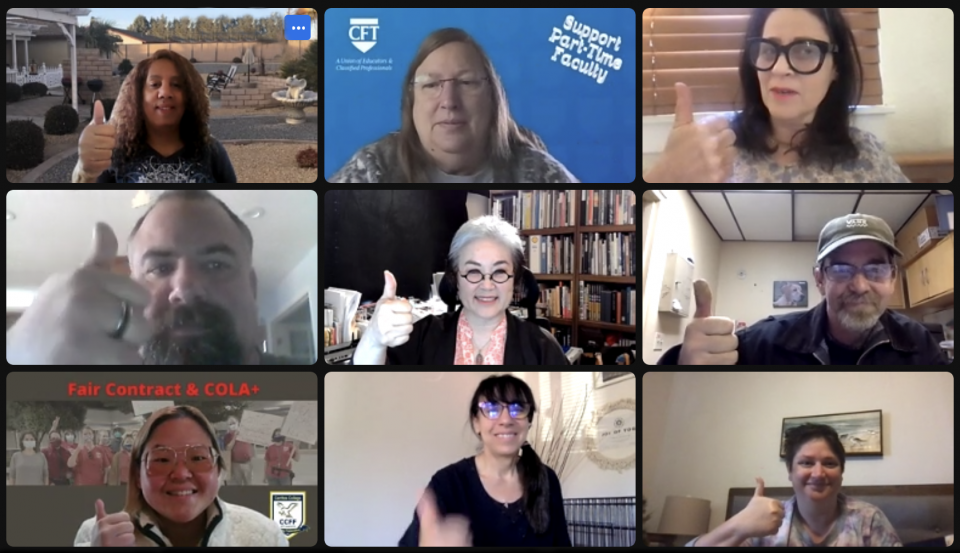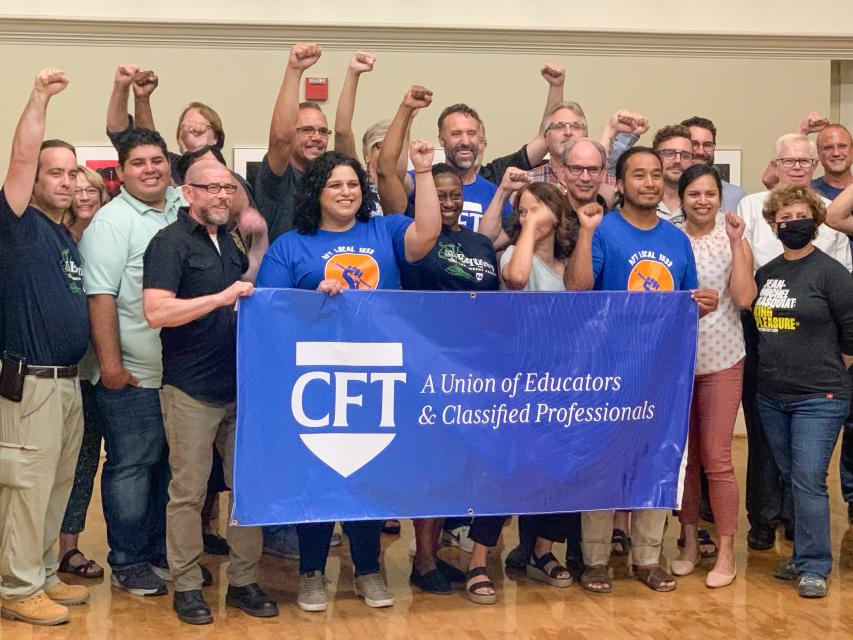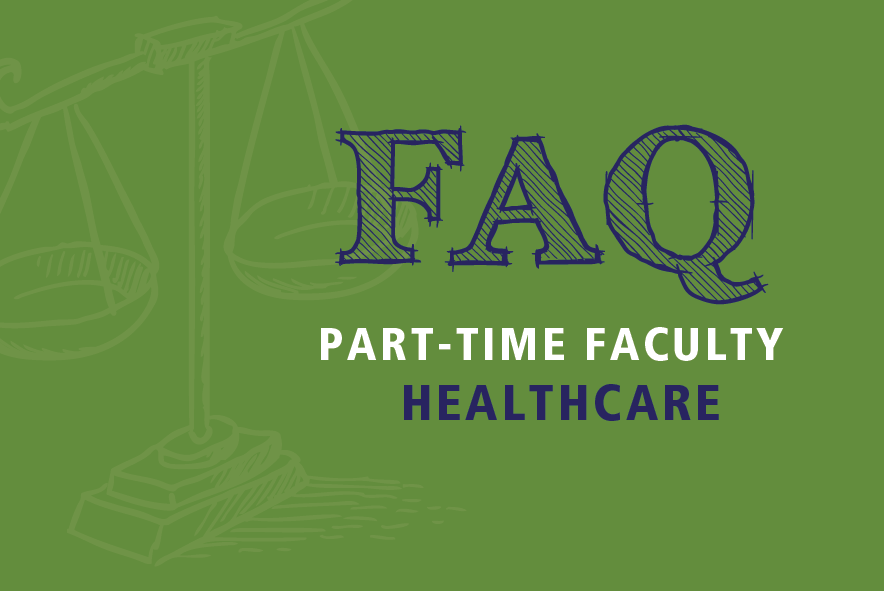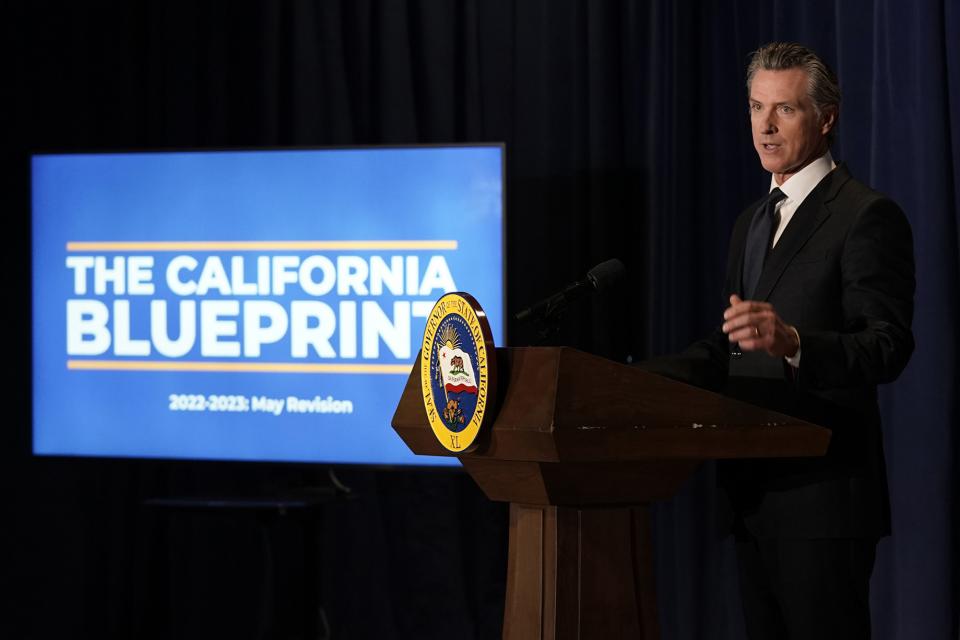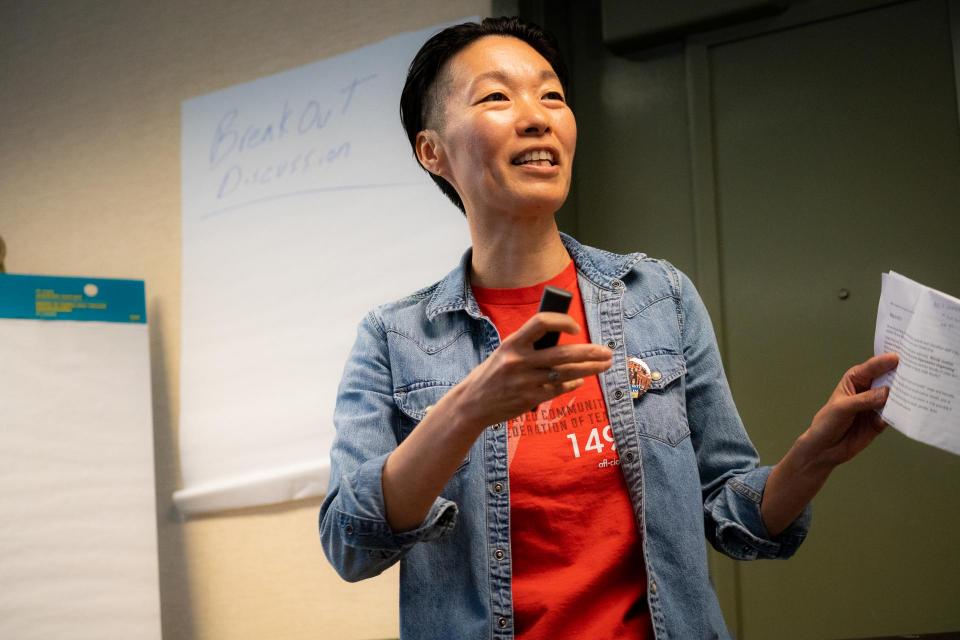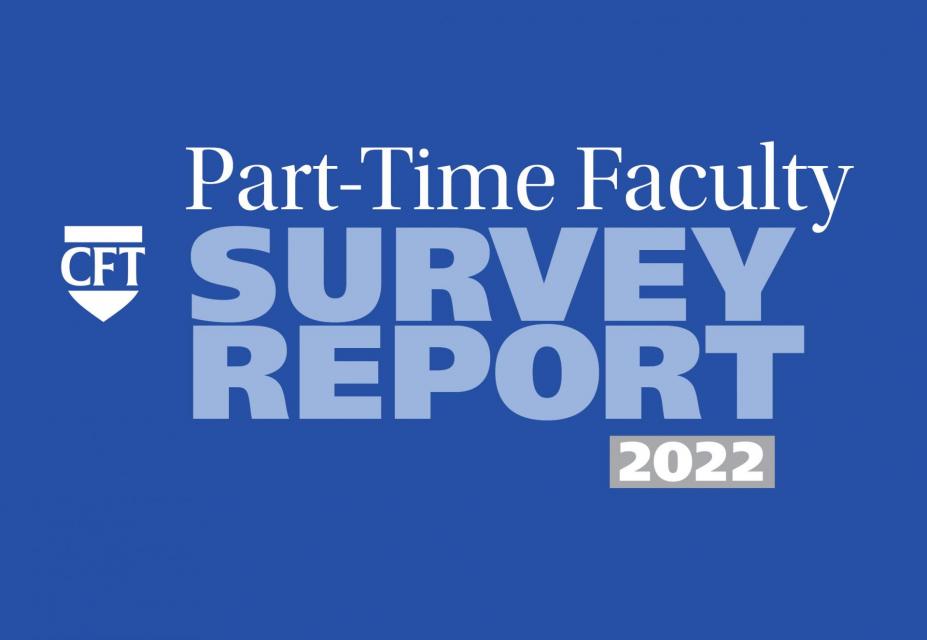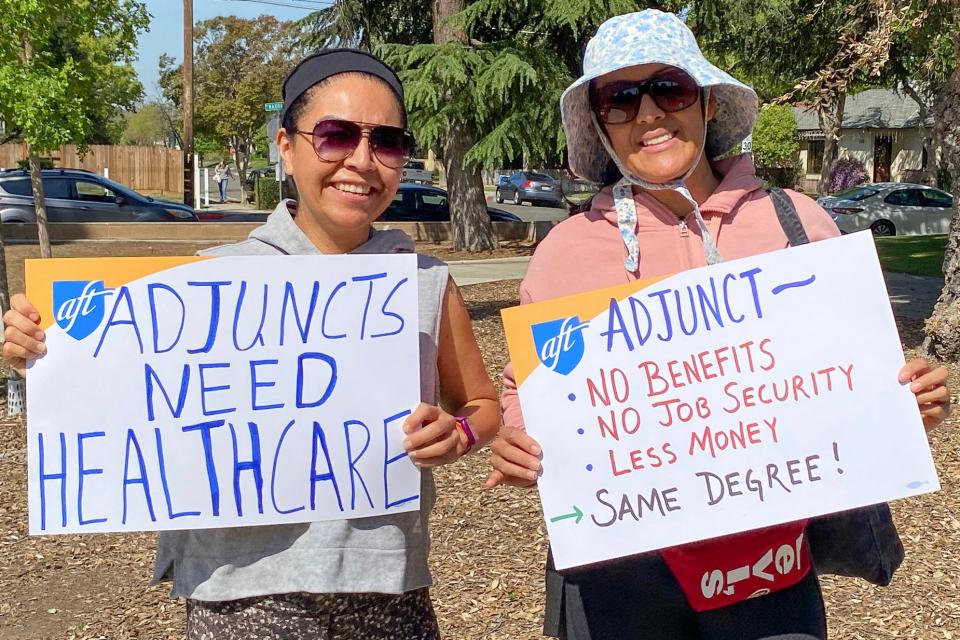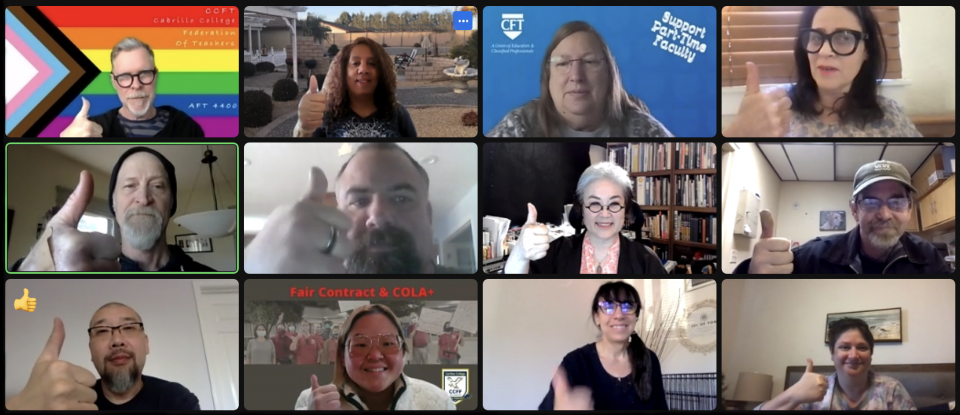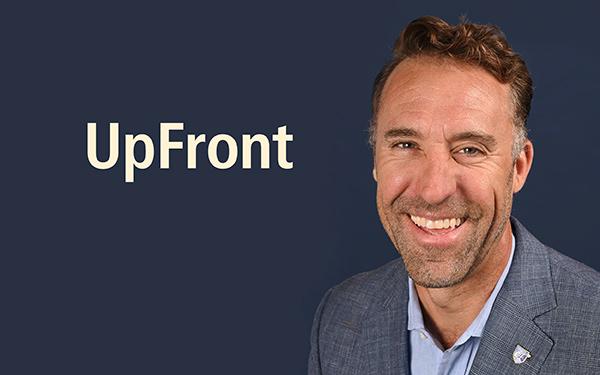Five critical bills on the Governor’s desk
Please urge Governor Newsom to sign them
***September 30, 2024 Update – Governor Newsom has signed AB 2245 and vetoed AB 2088, AB 2277, AB 2586, and SB 1182**
Five critical pieces of legislation are on the Governor’s desk. Please take a moment to sign the letters below, urging him to sign these important bills.
CFT to sponsor essential legislation for 2023-2024 legislative session
Legislative Update
INTRODUCTION
With the 2023-2024 California Legislative Session beginning, the CFT will be engaging in a new environment at the state Capitol. With several education champions reaching their term limits, and a large sector of the legislative staff turning over, the Legislative Department will be focusing on building new relationships with newly-elected legislators and their staff.
Local bargaining for part-time faculty healthcare ramps up
Phase 2 of Part-Time Faculty Campaign kicks off with regional meetings, negotiations training, Campus Equity Week
Securing annual funding for part-time faculty healthcare is an unprecedented legislative win. The next step is to secure that healthcare at the local bargaining table.
Legislative high and low for part-time faculty
Healthcare funding increased in state budget, but higher workload cap vetoed
California community college adjuncts saw the single greatest gain for part-time faculty ever—$200 million in ongoing annual funding for part-time faculty healthcare—but felt bitter disappointment when CFT’s sponsored bill to lift the teaching cap to 85% of a full-time load died for a second time on Governor Newsom’s desk.
AFT resolution asks U.S. Department of Education to conduct higher ed study
Calls for national data about adjunct/contingent pay and benefit inequities
CFT once again demonstrated its commitment to adjunct/contingent faculty by submitting and winning unanimous passage of its resolution “Calling for Department of Education Study of Pay and Benefit Inequity” at the AFT Convention July 15 in Boston.
Governor signs six CFT bills, plus budget trailer bills with union priorities
Legislative Update
Governor Newsom signed six union bills at the end of September that the CFT successfully lobbied in both houses of the Legislature. The CFT had sponsored or co-sponsored 16 legislative bills alongside several budget proposals in the last year of the 2020-22 legislative session. A majority of these priorities made it to the governor’s desk or were included in the state budget, with only one bill being vetoed by the governor.
FAQ: Part-time faculty healthcare, collective bargaining & state budget
Answers to common questions
Updated September 27, 2022
This year we won a historic expansion of state funding for part-time community college faculty healthcare, increasing state support from $490,000 to $200 million in ongoing funding.
The funding will enable local community colleges to provide quality, affordable, and accessible healthcare to substantially more part-time faculty. Local unions should now prepare to go to the bargaining table to negotiate the healthcare implementation.
What budget trailer bills mean for education workers
Legislative Update
On September 30, Governor Newsom signed the final budget trailer bills sent to him by the Legislature after passing the bills and a “budget junior” on August 31. Budget trailer bills are created by the Committee on Budget to provide technical language for the implementation of fiscal allocations. The budget junior bill includes additional allocations as well as additional items necessary for implementation of some July budget expenditures.
The budget-related bills go into effect immediately. CFT priorities in the budget trailer bills are listed below.
Faculty push for the face-to-face classes that students want
In-person college classes improve learning, build campus community, and lifelong connections
Joshua McCann much prefers going to campus for his San Diego Community College District classes. Now in his second year and intending to transfer to a UC and major in political science, McCann says connections on Zoom or in your Canvas inbox can’t compare to being with a person in real life.
McCann goes to campus for three out of his four classes. The other night after his philosophy class, he stayed for office hours with the teacher, and ended up having a two-hour conversation about the class with some of the other students.
Join a campaign kickoff meeting on Zoom — Faculty Healthcare Now!
In phase 2, learn how to secure funding for part-timer healthcare in your community college district
We invite local union leaders, activists, and rank-and-file members to please join us and kick off this phase with faculty power!
In Phase 1 of the Part-Time Faculty Campaign, our collective efforts secured $200 million in ongoing funding for part-time faculty healthcare in the California state budget. Now in Phase 2, we are launching coordinated collective bargaining as members begin to mobilize and bargain in their home districts to secure this funding in contracts or MOUs.
Urge governor to increase workload cap for part-time faculty
Ask Governor Newsom to sign CFT-sponsored bill to raise the cap to 85%!
UPDATE: We are disappointed to report Governor Newsom vetoed AB 1856 on September 25, citing cost concerns. Find his veto message here. This action is now closed.
Please take a moment to urge Governor Newsom to sign AB 1856, which will increase the workload cap available to part-time faculty from 67% up to 85% of a full-time faculty workload in California’s community colleges.
Join a campaign kickoff meeting this fall — Faculty Healthcare Now!
Local mobilizing and bargaining — learn how to secure funding for part-time healthcare in your community college district
In phase one of the Part-Time Faculty Campaign, our collective efforts secured $200 million in ongoing funding for part-time faculty healthcare in the California state budget.
Now we are launching phase two — coordinated collective bargaining — as members begin to mobilize and bargain in their home districts to secure this funding locally.
FAQ: Part-time faculty healthcare, the state budget, and collective bargaining
Quick answers to common questions
Updated July 1, 2022
About half of the California community college districts offer healthcare benefits for part-time faculty; the quality of the benefits is wide ranging with some offering the same benefits package to full- and part-time faculty and some offering very modest stipends to help cover the cost of insurance.
State budget continues record funding for public education, secures funding for part-time faculty healthcare
Legislative Update
Funding for part-time community college faculty healthcare secured
Governor Newsom signed the final state budget on Friday, June 30 after the governor and state legislators reached agreement on the 2022-23 budget over the weekend. The deal includes record levels of funding for public education and the $200 million to support part-time faculty healthcare that CFT has been championing throughout this budget process.
Part-timers and allies lobby legislators for healthcare, pay parity
PHOTO GALLERY
Students and full-time faculty join forces with part-time faculty
From the Bay Area to San Diego, and from the Central Valley to the Mojave Desert, part-time community college faculty, along with full-time faculty and student allies, gathered at Sacramento’s famed Sutter Club on Monday morning, May 1, to go forth and make California legislators aware of the critical need for part-time faculty healthcare and pay parity.
Part-Time Faculty Conference empowers through learning
PHOTO GALLERY
Workshops focus on bargaining, lobbying, organizing, diversity, communications
When it comes to union work, power and knowledge work hand in hand. Union is not simply about expressing demands, speaking truth to power, and being resolute in the face of adversity. It’s about making connections, sharing truths, building solidarity, empowering, and speaking to be heard.
Developing the knowledge to do these things and putting the power of that knowledge to use was core to the workshops at the CFT Part-Time Faculty Conference held May 1-2 in Sacramento.
Groundbreaking CFT survey calls out healthcare crisis among part-time faculty
Critical insights into part-time faculty in community colleges statewide
The results of CFT’s groundbreaking statewide survey of part-time faculty offer critical insights into the daily, personal, and structural challenges that part-time and contingent faculty experience when it comes to healthcare.
A “red letter year” for CFT legislation in support of contingent faculty
Healthcare insurance, teaching load, rehire rights, and parity
COVID and the subsequent student enrollment drop during the last two semesters have placed great burdens on contingent faculty, from scrambling to teach remotely to negotiating personal and family challenges to facing reduced assignments and a loss of healthcare benefits.
New AFT report shows pandemic wreaked havoc on nation’s adjunct faculty
Transition to remote learning, impact of virus lead to declines in job security, increased reliance on public assistance
WASHINGTON — A new national adjunct faculty survey from the AFT underlines the brutal economic reality faced by millions of contingent and adjunct faculty at the nation’s colleges and universities — and illustrates how the pandemic further eroded job security and bolstered the need for public help.
Part-time faculty step up to win the healthcare they deserve
Dozens of faculty testify before state legislative committees
Dozens of CFT members testified this week in front of two different budget subcommittees of the California Legislature to urge our elected leaders in Sacramento to support Governor Newsom’s $200 million proposal in the state budget to fund healthcare for part-time faculty in California’s community colleges.
Following the launch of CFT’s campaign for part-time faculty healthcare last fall and a successful letter campaign, the governor included the $200 million in his January budget proposal.
UC lecturers’ victory inspires broad movement for equity across higher education
CFT wages a campaign for part-time faculty in the community colleges
By Jeffery M. Freitas, CFT President
For about three years the University Council-AFT engaged in protracted negotiations on behalf of lecturers in their unit. Their aims have always been about fairness — better working conditions for lecturers and improved learning conditions for students. Their fight has been about not only winning economic and contractual gains for members, but gaining professional respect and recognition for their teaching at the University of California. Their campaign has been a true member-driven effort, rooted in years of organizing by the statewide local that represents both continuing lecturers and librarians, led by their president, Mia McIver, and a committed negotiations team.
CFT launches campaign to secure healthcare for part-time faculty
“Adjuncts deserve, at the very least, the basic right of healthcare”
The pandemic has pushed many harsh realities in higher education to the forefront, none more so than the inadequacy of healthcare for part-time faculty. With the cost of an average COVID hospitalization, according to a number of sources, running in excess of $20,000, the financial effects alone on an uninsured part-timer contracting COVID can be devastating. Add a possible uninsured family member or members to the mix, and the reality becomes even more frightening.



